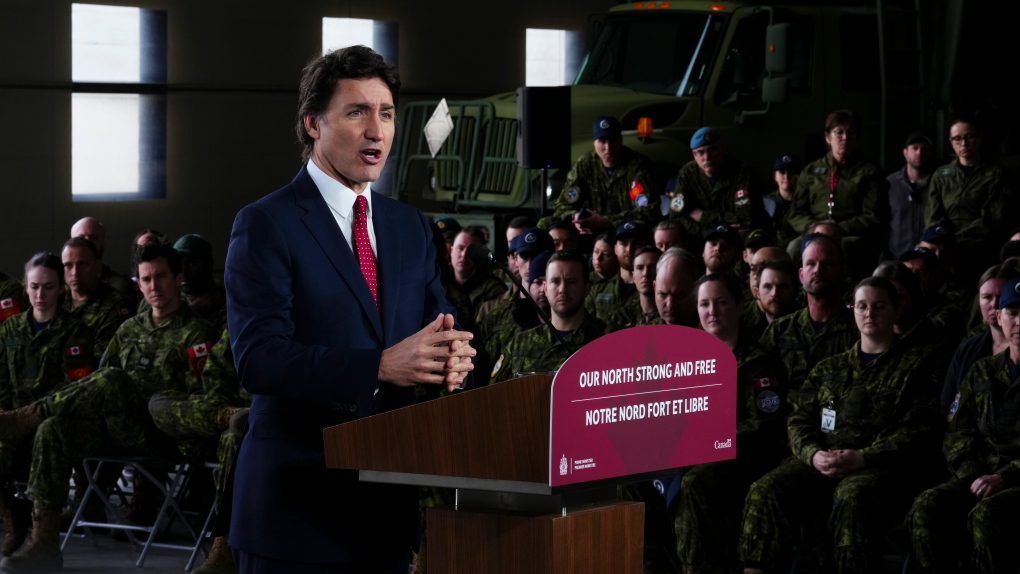I’m traditionally very anti-millitary, but with the increased pressure from Russia and the war in Ukraine I think this is a good call. If we make ourselves look like too easy a target, or make our allies feel like we are not willing to pull our weight, we are undermining ourselves.
“73B over 20 years” *laughs in American *
preparing for war.
just what we needed, great!
Better than not preparing for war. I can’t see how Trudeau would be responsible for Russian aggression and Israel antagonizing every Islamic country around them and just goading them to strike back, or China’s ambition to retake Taiwan…
We don’t need war but it would stupid to just stick our heads in the sand. It’s not like we can send out diplomats and pray for world peace.
Wonder how many houses we can build with that money.
Arguably one of Canada’s greatest contributions to WW2 was our production of the CanPat trucks.
“Amateurs talk strategy; professionals talk logistics” was the quote from Gen. Omar Bradley IIRC, and I imagine in any conflict we become embroiled in (or wish to dissuade someone else from becoming embroiled in) we can contribute greatly to the logistics side.
I’d like to see a Canadian version of the US’ Army Corps of Engineers. Right now, it could help with natural disasters, and could also help with infrastructure projects. In a conflict, they could prove invaluable in actually getting fuel and supplies to the conflict zone.
Coastal patrol and Arctic patrol are two other areas where I think Canada has to stand alone to some extent.
Construction labour in Canada is near 100% utilization in Canada. There is no glut of qualified construction tradespeople just sitting around waiting for funding. So on its own without qualification the answer to your question is approximately zero more homes than would otherwise be built.
Construction labour in Canada is near 100% utilization in Canada.
True but there are other ways to spend money that doesn’t involve having more construction happening at once. For example, buying land to be used for non-market housing. This one taken seriously would dry up the whole 73B already. Buy already built properties, give more financial incentives for multi-family housing, etc. There’s a long list of things of expensive solutions waiting.
Send that money to provinces tied to strict usage rules towards transit oriented development and non-market housing. For example, Translink needs funding and expanding mass transit is one way to improve the housing crisis.
Why are we not training more construction workers? Do they expect the immigration growth will bring the houses with them?
If you look here, you’ll see that all the trades involved in housing construction are on the list for fast-track immigration already.
As for training, we may find that it’s more the number of people leaving the trades that is the problem. It’s not that the pay is bad, exactly, but it’s an industry extremely prone to boom/bust cycles. People leave for jobs with some sense of stability. Increasing unionization and enhancing EI might be more cost effective than funding more training.
Thats interesting, wasn’t aware of the cyclical nature! I thought that construction happens all year round? Or is it due to poor staffing?
Construction is heaaaavily influenced seasonally. Thats obviously largely dependent on the field of construction (ie residential, commercial, heavy construction, underground, factory, etc)
A large number of the contractors I work with either lay everyone off, or fully shut down over the winter. As soon as things start freezing, construction costs skyrocket. Daylight hours mean fewer working hours (unless you want to provide sufficient lighting, which is another expense), quarries and pits close, concrete requires winter heat and heating for the first 3 days to sufficiently cure, etc.
Additionally, construction is very boom/bust, where the rest of the economy impacts how much work is available for them. Right now, theres a huge demand. But go back and theres been two or three big slow downs in the residential construction industry in the last 15 years, which pushes people to other jobs (as mentioned by the other poster). When the economy is slow, there’s less investment in infrastructure by corporations, meaning there’s less demand for factory/commercial construction, and the host of trades that go with it.
Trades are a specific job that often have lots of working experience, so when a good quality tradesperson leaves, its hard to get the experience and knowledge to replace them effectively.
Very interesting! Seasonality is interesting, I assumed construction could still happen in winter, but higher cost definitely makes sense in terms of effectively reducing it to a minimum level.
Sad that economy plays a big role in terms of essentially laying off a lot of workers (forcing some to quit the industry). I wonder if that also applies to the manufacturing and car industry too
Alright, it’s funny how a similar post on investing in public compute for AI got comments on “what about housing” upvoted to the top, while this comment gets downvoted with very little “discussions”.
Now that it’s the military all of a sudden there’s nothing to criticize, guess it’s a good investment that will not end up in the pocket of the military?
Again, not saying the military shouldn’t be getting that money; clearly arctic defense is not off the table with how Russia has been acting. What I’m saying is how differently people here react to doing something crucial like building a national AI strategy that could hedge against private-held automation technology, vs spending on the military to potentially defend against Russians.
Yes, housing needs more money (and better planning), but so does public AI infrastructure (used to benefit Canadians) and military.
Bootlicker take btw.
Canadians and the public tend to be supportive of infrastructure or spending that supports their life or provides tangible good.
The Canadian military has time and time again proven to support the Canadian people in times of crisis. Whether that be snowfall in Toronto or record flooding in Ottawa or annual forest fires in Alberta that are getting worse.
We can spend the money on the military to ensure its there for when we need it. Provide the military money to house, clothe and feed those soldiers, or…
We can fund AI that most Canadians are worried about.
The announcement doesn’t mention anything about a better salary for military, or about better mental health support after discharge or better pension. The military budget increase will be to build arctic bases and upgrade submarines. How exactly does that help the actual soldiers?
If you’re having trouble paying your bills and your boss gives you a raise that makes paying your bills easier, right? Now you have freed up income that can properly go other places and be spread evenly instead of going paycheque to paycheque.
The military funding in Canada is Anemic to say the least. Yes, the money goes towards bases and subs up north but this is still a net positive for funding in the CAF. Thus a net positive for Canadians.
**Even if that money is given to you via grocery store gift cards as a “bonus” you now don’t have to spend rent money on food.
What’s happening with this funding is that your boss heard you had trouble paying for your bills, so they asked for a bigger budget, and used the extra money to move the office to a nicer building, buy better screens and chairs in the new office, but does not increase your salary.
If you mean the announcement gives the “perception” that soldiers are being helped when in reality it will be given to private companies then yeah it makes sense
Definitely some. I’m sure they’ll be building housing for the staff on site at the “Arctic satellite ground station” and “northern operations hubs”.
Just join the army. Free room and board.
If you’re lucky enough to be placed in an area that has room and board. Many new Canadian soldiers, airmen and sailors are forced to live in their cars or rely on the local economy. Base infrastructure and base housing are falling apart. Literally asbestos walls filled with rodents. Or WW1 horse barns turned into troop bays.
The lack of funding to the military also affects housing for the general public. No money for the CAF to build houses means 10k+ soldiers per base taking housing and apartments away from the local economy.
No funding to the CAF means less CAF owned infrastructure, means less housing for the public. Worse conditions for the military means fewer soldiers to protect our sovereignty when the call comes. Money spent on funding the military can be and is money spent on housing.
Not sure why you’re getting downvoted, it’s a very good question.





